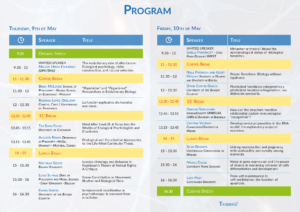Date and time: February 19, Tuesday, 11:30 a.m.
Location: Carlos Santamaría Building, Room B14.
Speaker: Iñaki San Pedro (UPV/EHU)
Title: Degrees of Epistemic Opacity
Abstract:
The paper distinguishes two senses of “epistemic opacity” in computer simulations, namely a qualitative sense and a quantitative sense, and explores their relation to actual simulating and modelling practices.
From a qualitative point of view, the notion of “epistemic opacity“ in computer simulation seems to have the same significance and implications for any computer simulations. That is, from a qualitative point of view, computer simulations seem to be equally opaque —i.e. we open the black box, and find it (always) dark! In this sense “epistemic opacity” expresses the fact that when a computer simulation is performed there is an “epistemic leap” associated to it. This kind of epistemic leap is characteristic rather than of a specific model or simulation, of the fact that a simulation is performed.
On the other hand, “epistemic opacity” can also be approached from a quantitative point of view. The questions to be asked then are rather different, e.g. is the “epistemic leap” noted above always of the same size? or are all computer simulations equally opaque, i.e. when we open the back box and find it dark, is it always as dark? The paper argues that (from this quantitative point of view), computer simulations display degrees of “epistemic opacity” (with the limit of non-opacity set in analycity). I will not discuss here whether these degrees of “epistemic opacity” can be measured (i.e. exactly quantified), or attempt provide a method for doing that. I will claim nevertheless that actual degrees of “epistemic opacity” are tightly related to what we can call the “complexity of the computational process”, which is associated for instance to the particular design of the computing software at work, specific computer settings, or to hardware limitations. With this idea of complexity in mind, I will claim, the more complex a computational process is, the more (quantitatively) epistemically opaque will the simulation result.
I will note finally that a good deal of methodological decisions taken by scientist and modellers when performing computer simulations —i.e. typical tricks-of-the-trade such as parametrisation, use of expert knowledge, scaling, etc.—, which constitute an important part of current scientific practices in the field, are precisely aimed at reducing such complexity. I will conclude thus that actual scientific practices (or part of these, at least) in fact reduce (quantitative) “epistemic opacity.” This opens new and interesting questions such as whether actual scientific practices can manage to reduce “epistemic opacity” to the limit of analycity (thus eliminating “epistemic opacity” also in a qualitative sense), whether specific scientific practices can be said to reduce in some (qualitative) sense some of the uncertainties that computer simulations involve, or whether they have an impact on the reliability or confidence of specific computer simulations (possibly of the very same system).

